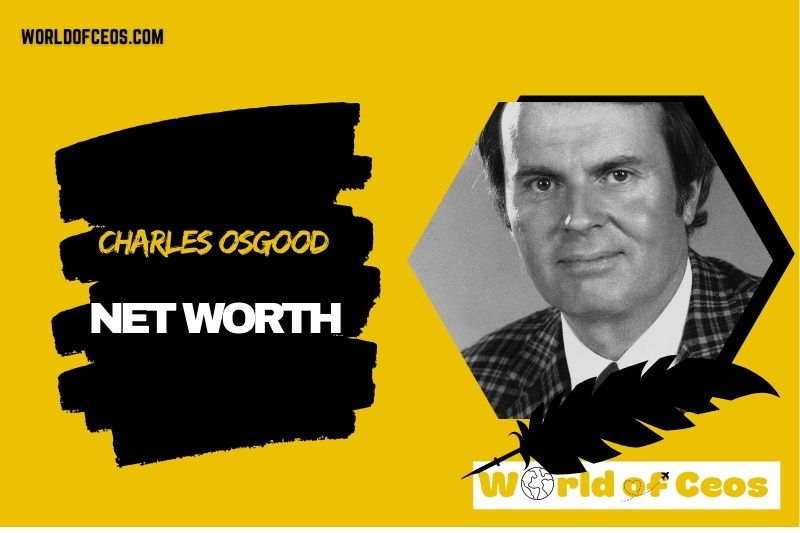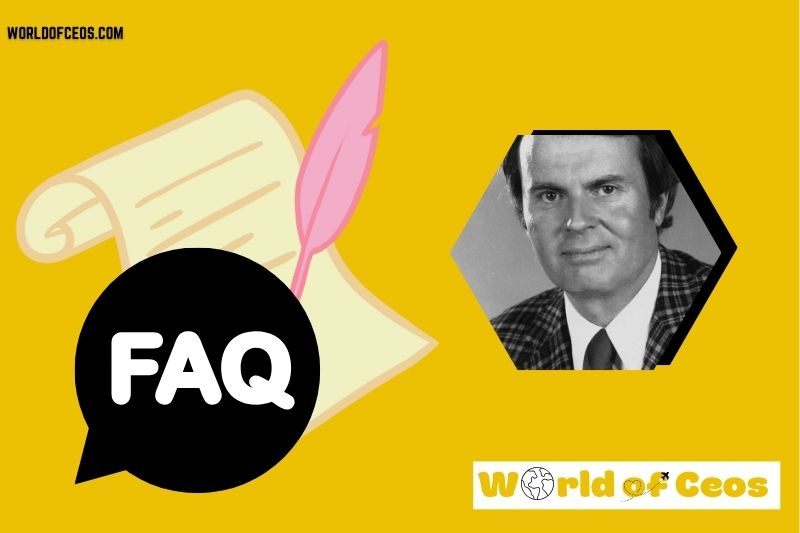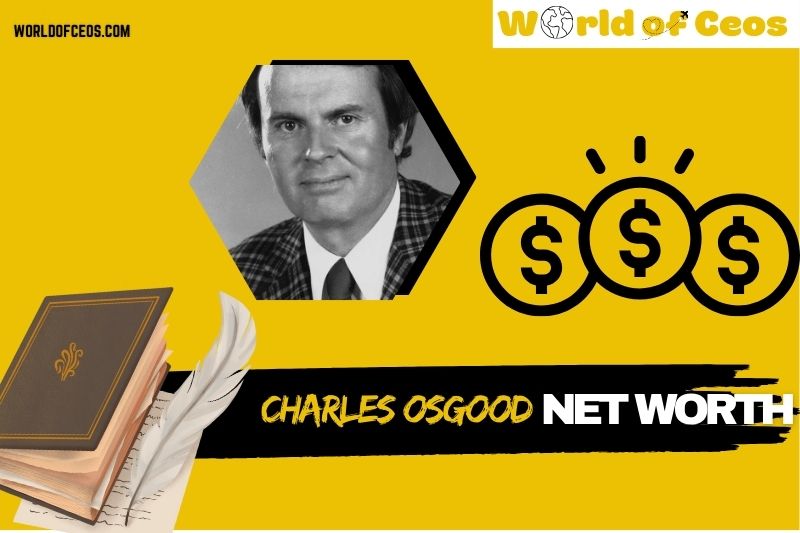Hey there! It’s WorldofCeos, and today, we’re diving into Charles Osgood net worth. The broadcasting icon, known for his warm style on CBS Sunday Morning, created a legacy and wealth that’s just as intriguing as his career.
Osgood’s journey in journalism brought him many honors, an expansive audience, and a place in the broadcasting elite. Let’s take a look at how his career brought him financial success and enduring fame.
Quick Facts
| FACT | DETAIL |
|---|---|
| Real Name | Charles Osgood Wood III |
| Popular Name | Charles Osgood |
| Gender | Male |
| Birth Date | January 8, 1933 |
| Age | 91 (Died: January 23, 2024) |
| Parents | Charles Osgood Wood II, Mary Osgood |
| Siblings | N/A |
| Birthplace | The Bronx, New York City, NY |
| Nationality | American |
| Ethnicity | N/A |
| Education | Fordham University, B.S. in Economics |
| Marital Status | Married |
| Spouse | Jeanne Crafton |
| Children | 5 (Winston Wood, Jamie Wood, Emily J. Wood, Kathleen Wood Griffis) |
| Dating | N/A |
| Net Worth | $5 million |
| Source of Wealth | Broadcasting |
| Height | N/A |
What is the Net Worth of Charles Osgood in 2024?

In 2024, Charles Osgood’s net worth was estimated at $5 million. His wealth, primarily from his decades in broadcasting, reflects a steady, respected career in a competitive industry.
With similar roles and a longstanding career, Osgood’s wealth compares to other influential figures in broadcasting.
Check out our list of notable peers from his era and field:
- Ted Koppel
- Alan Alda
- Dr. Seuss
- Jack Haley Jr.
- Charles Kuralt
- Jeanne Crafton
- Dr. Seuss
- John Cacavas
- Everett Dirksen
- Jane Pauley
For more on wealthy authors and broadcasters, check out our list of the richest authors.
Charles Osgood Salary and Finance Overview

Career Beginnings and Initial Wealth from Radio Broadcasting
Charles Osgood’s broadcasting career began at Fordham University when he worked at the school’s WFUV radio station. There, he explored his interest in news and storytelling, which proved pivotal in forming his on-air persona.
After college, he joined CBS Radio in 1967, taking on a variety of roles, including anchoring the morning drive shift at WCBS. These early experiences paved the way for his eventual wealth and allowed him to hone his style as a poet in residence, often delivering news in rhymes.
Contributions to His Wealth from CBS Television and Radio
Osgood joined CBS News in the early ‘70s, where he truly made a name for himself. By 1994, he was the face of CBS Sunday Morning.
This long-standing role brought him steady financial growth and wider recognition. On the radio side, his success was cemented by his show, The Osgood File.
These projects not only provided income but also gave him unique cultural significance within American media.
Noteworthy Achievements and Awards That Boosted His Image
Osgood’s career gained even more credibility with key awards. Notably, he received a Grammy Award for Best Spoken Word Performance for his work on Gallant Men.
This Grammy, in a highly respected category, gave him both prestige and increased recognition.
Other honors included the NAB Hall of Fame and additional acknowledgments from CBS and related organizations.
These awards validated his contributions, making him an icon in both radio and television broadcasting.
Additional Sources of Income and Literary Contributions
Osgood’s financial story includes more than just his broadcasting roles. Over the years, he authored several books, like Defending Baltimore Against Enemy Attack, which offers reflections from his childhood.
His writing work helped diversify his income while allowing him to share his personal history.
He also contributed columns to syndicated newspapers and collaborated with Dr. Seuss as the narrator of Horton Hears a Who! This project, along with other creative work, brought new audiences and an additional revenue stream to his already established career.
Personal Life and Early Influences on His Career
Osgood’s experiences as part of the U.S. Army Band played a big role in shaping his professional journey.
In the Army, he performed as a pianist, which developed his comfort in front of audiences. His early days in the Army laid the groundwork for his future success in broadcasting.
Later, he moved with his family to Englewood, New Jersey, which positioned him well for the metropolitan broadcasting scene.
His family, including his wife Jeanne Crafton, provided essential support throughout his career.
The Legacy and Impact of His Broadcasting Career
Osgood left a lasting mark on American journalism. Through his work on CBS Sunday Morning and The Osgood File, he influenced how news is shared with audiences, blending information with a uniquely poetic style.
His weekly sign-off, Until then, I’ll see you on the radio, became his trademark, remembered by fans even today. His legacy has influenced generations of journalists and broadcasters, inspiring many to follow in his footsteps.
FAQs About Charles Osgood

What was Charles Osgood’s primary source of wealth?
His wealth came mainly from his work in broadcasting, particularly his time with CBS News and The Osgood File.
Who was Charles Osgood’s spouse?
Charles Osgood was married to Jeanne Crafton, with whom he had five children.
Did Charles Osgood win any significant awards?
Yes, he won a Grammy Award for Best Spoken Word Performance for Gallant Men, and he was inducted into the NAB Hall of Fame.
What roles did he serve in the U.S. Army?
Osgood served in the U.S. Army Band as a pianist and announcer, experiences that significantly influenced his broadcasting career.
What made Charles Osgood famous on CBS Sunday Morning?
His unique poetic style, warm sign-off, and consistent presence as host made him memorable to viewers.
Did he write any books?
Yes, Osgood authored several books, including Defending Baltimore Against Enemy Attack and See You on the Radio.
How did he begin his broadcasting career?
Osgood started at WFUV, Fordham University’s radio station, which led him to early roles in broadcasting.
What was Charles Osgood’s signature sign-off?
Osgood was known for signing off with, Until then, I’ll see you on the radio.
Where did Charles Osgood receive his education?
He earned his bachelor’s degree in Economics from Fordham University.
Was Charles Osgood involved in film or narration work?
Yes, he narrated Horton Hears a Who! in collaboration with Dr. Seuss.
Conclusion
Thanks for reading! I hope you enjoyed this deep dive into Charles Osgood’s life and career.
Let me know your thoughts in the comments, and explore more content on WorldofCeos for insights into the world’s most fascinating financial stories.

